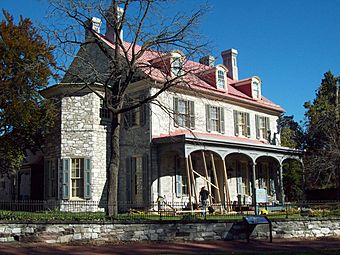Simon Cameron House facts for kids
|
John Harris – Simon Cameron House
|
|

John Harris – Simon Cameron House, November 2010
|
|
| Location | 219 S. Front St., Harrisburg, Pennsylvania |
|---|---|
| Area | less than one acre |
| Built | 1766 |
| Architect | John Harris, Jr. |
| Architectural style | Georgian |
| NRHP reference No. | 73001620 |
Quick facts for kids Significant dates |
|
| Added to NRHP | September 20, 1973 |
| Designated NHL | May 15, 1975 |
The Simon Cameron House, also known as the John Harris Mansion, is a historic house in Harrisburg, Pennsylvania. It was built way back in 1766. This makes it one of the oldest buildings in Harrisburg.
The house is famous because it was the summer home of Simon Cameron (1799–1889). He was a very important politician in the Republican Party. He was active during and after the American Civil War. Today, the house is a museum. It was given to the Historical Society of Dauphin County in 1941. In 1975, it was named a National Historic Landmark.
Contents
What Does the Simon Cameron House Look Like?
The Simon Cameron House is located south of downtown Harrisburg. It has a great view of the Susquehanna River. The main part of the house is a two-and-a-half-story building. It is made from strong stone.
Architectural Style and Features
The house has a roof that slopes down on two sides. A porch with fancy columns is at the front. This porch has arched decorations. The front of the house has four sections with windows. The main door is in the middle-left section. It has a tall window above it.
Three windows stick out from the front roof. These are called gabled dormers. A long, two-story section extends from the back of the house. This gives the house a unique T-shape.
Who Lived in the Simon Cameron House?
The house was built around 1766 by John Harris Jr.. His father was one of the first people to settle in this area. In fact, the city of Harrisburg is named after John Harris's father!
From Family Home to College
The Harris family owned the house until 1835. Later, in 1853, the house became a school. It was called the Pennsylvania Female College. However, the college faced problems and went out of business in 1861. This happened because of the difficult times during the American Civil War.
Simon Cameron's Influence
After the college closed, Simon Cameron bought the house. He had been on the college's board of directors. Simon Cameron was a very powerful politician. He had served as the United States Secretary of War. He later became a U.S. Senator in 1867.
Cameron was known for his strong influence in politics. He helped shape the government during President Ulysses S. Grant's time. He also made changes to the house. He gave it the Victorian style we see today.
A Museum for Everyone
Simon Cameron's family later gave the house to the Historical Society of Dauphin County. This happened in 1941. Now, the society runs the house as a museum. Visitors can learn about its long history and the people who lived there.
See also
- National Register of Historic Places listings in Dauphin County, Pennsylvania
- List of the oldest buildings in Pennsylvania
- List of National Historic Landmarks in Pennsylvania
 | Precious Adams |
 | Lauren Anderson |
 | Janet Collins |



